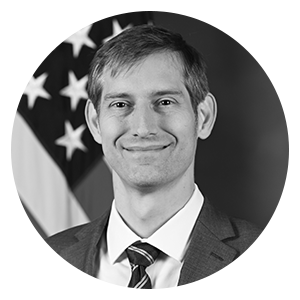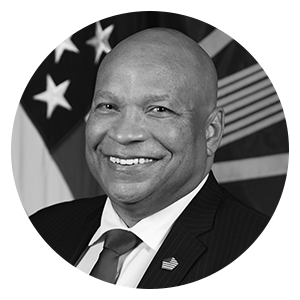Featured Speakers

Young Bang
Principal Deputy, Assistant Secretary of the Army Acquisition, Logistics, & Technology
U.S. Army
Read More
Young Bang
Principal Deputy, Assistant Secretary of the Army Acquisition, Logistics, & Technology
U.S. Army
Mr. Young Bang was appointed as the Principal Deputy Assistant Secretary of the Army (Acquisition, Logistics & Technology) on 8 March 2022. As the Principal Deputy, Mr. Bang advises the Assistant Secretary for Acquisition, Logistics & Technology and Army leadership on all matters relating to Army acquisition.
Prior to joining ASA(ALT), Mr. Bang served at the C Suite or EVP level at multiple large and mid size companies leading P&L, building business and growth and product development across services and product companies. He has broad experience in M&A on both buy and sell side and has used his broad knowledge of addressable markets to guide the growth in existing, adjacent and new markets/capabilities. His extensive experience spans commercial and federal consulting covering technology, healthcare, telecom and strategy. From a technology perspective, he has deep expertise in Cutting Edge Technology (Quantum, Artificial Intelligence, Deep Learning, AR/VR/MR/XR etc.) and Digital Transformation (Modern Software Development, Big Data, Cloud, IoT) to drive growth across multiple markets from Army, Navy, Air Force, Joint, Intelligence, Health (Federal and Commercial), DHS, DoJ, DoT and DoS. Mr. Bang has worked in product development in hardware and software, cyber, data and AI as well as startups during the dotcom period. Prior to that Mr. Bang served in the Army in various leadership positions across Ft Bragg, Korea and Aberdeen Proving Grounds.

John Burke
Principal Director, Quantum Science
Office of the Assistant Secretary of Defense for Science & Technology
Read More
John Burke
Principal Director, Quantum Science
Office of the Assistant Secretary of Defense for Science & Technology
Dr. John Burke joined the Office of the Undersecretary of Defense for Research and Engineering (OUSD (R&E)) for Science and Technology (S&T) as the Principal Director for Quantum Science in March 2022. In this role, Dr. Burke was responsible for leading the Department of Defense’s (DoD) strategy for quantum science, one of DoD’s top critical technology areas.
Prior to joining OUSD (R&E), Dr. Burke served as a Defense Advanced Research Projects Agency (DARPA) Program Manager in the Microsystems Technology Office (MTO) and Defense Sciences Office (DSO) from 2017 to 2022. At DARPA, he managed seven programs developing quantum science and technology. Some of these programs advanced quantum sensors including atom interferometers, atomic clocks, magnetometers, and radio frequency (RF) “Quantum Apertures” and applied the sensors toward new capabilities in position, navigation and timing (PNT), biotechnology, as well as in the RF spectrum. Several programs advanced quantum computing qubit technologies based on both superconducting and photon-based platforms. This work resulted in several technology transitions to higher maturity development programs across the DoD, as acknowledged by his receipt of the DARPA “Results Matter” Award.
Previously, Dr. Burke worked in the Air Force Research Laboratory (AFRL) Space Vehicles Directorate as a Senior Research Physicist. There, Dr. Burke led a research team developing atomic clocks, optical time transfer, and cold atom measurement techniques for use in space applications such as the Global Positioning System. He contributed to space experiments including the NASA Cold Atom Laboratory for the International Space Station and the Navigation Technology Satellite -3. Dr. Burke won the AFRL Early Career Award and R-NASA National Award for Space Achievement in recognition for his contributions, multiple publications, and patents.
Dr. Burke holds a Bachelor of Science degree in Physics from Centre College and a Doctorate of Philosophy degree in Physics from the University of Virginia. His thesis work was on atom interferometry with guided matter waves sourced from a Bose Einstein Condensate, which won the University of Virginia Award for Excellence in Scholarship in Science and Engineering.

Maynard Holliday
PTDO Assistant Secretary for Critical Technologies
Office of the Under Secretary of Defense for Research and Engineering
Read More
Maynard Holliday
PTDO Assistant Secretary for Critical Technologies
Office of the Under Secretary of Defense for Research and Engineering
Mr. Maynard A. Holliday is Performing the Duties of Assistant Secretary of Defense for Critical Technologies in the Office of the Under Secretary of Defense for Research and Engineering. In this capacity, he oversees investment and capability analysis of the Pentagon's critical technology areas. He has oversight of 11 principal directors assigned to those critical technology portfolios and their roadmaps — the comprehensive strategies to manage, provide oversight and guide choices for each critical technology area. These critical technology areas include 5G; Advanced Computing & Software; Directed Energy; Human-Machine Interfaces; Hypersonics; Integrated Network Systems-of-Systems; Integrated Sensing & Cyber; Microelectronics; Renewable Energy Generation & Storage; Space Technology; and Trusted Artificial Intelligence & Autonomy.
Mr. Holliday has more than 30 years of professional experience leading technological innovations in both government and the private sector. Most recently, he was a Senior Engineer at the RAND Corporation working on autonomous vehicle safety metrics and policy, explainable artificial intelligence, swarm robotics and drone defense. Previously, he served as Senior Technical Advisor and Special Assistant to Frank Kendall, Under Secretary of Defense for Acquisition, Technology and Logistics. Mr. Holliday helped establish the Defense Innovation Unit Experimental and was a member of the Defense Science Board. Mr. Holliday has also worked for the Department of Energy as a project manager for the U.S.-Russia Nuclear Material Security Task Force. He was awarded the DOE’s Meritorious Service Award, its highest, for his exceptional service in helping secure tons of weapons grade nuclear material. Prior to his government service, Mr. Holliday was a senior engineering and robotics professional at the Lawrence Livermore and Sandia National Laboratories, as well as various robotics start-ups and technology companies in Silicon Valley.
Mr. Holliday is a co-organizer of Black in Robotics, a virtual world-wide community of roboticists and their allies whose mission is to bring together Black researchers, industry professionals and students in robotics to mutually support one another to help navigate academic, corporate, and entrepreneurial paths to success. He is also co-founder of Robot Garden, the robotics-themed hacker space in Livermore, Calif. He also has been working with Bay Area public schools lecturing on robotics and teaching robotics through the Citizen Schools program in East Oakland. Mr. Holliday was named Citizen Schools Volunteer of the Year for 2012 and was also recognized with a Presidential Volunteer Service Award from the White House for his efforts. Before leaving government service in 2017, he was awarded the Secretary of Defense Medal for Exceptional Public Service recognizing his contributions to national security through his considerable and trusted advice on multiple DOD initiatives.
Mr. Holliday graduated from Carnegie Mellon University in 1984 with a Bachelor of Science degree in Mechanical Engineering. He later won a scholarship to attend Stanford University, where he earned a Master of Science in Mechanical Engineering Design with an emphasis on robotics, international security and arms control. Mr. Holliday also won a scholarship to attend the International Space University in France and was a two-time finalist for the U.S. Astronaut Corps.

Frank Peterkin
Principal Director, Directed Energy
Office of the Assistant Secretary of Defense for Critical Technologies
Read More
Frank Peterkin
Principal Director, Directed Energy
Office of the Assistant Secretary of Defense for Critical Technologies
Dr. Frank Peterkin serves as the Principal Director for Directed Energy in the Office of the Under Secretary of Defense for Research and Engineering (OUSD (R&E)). In this role, Dr. Peterkin serves as the Department of Defense (DoD) Senior Official for Directed Energy, including High Energy Laser and High Power Microwave systems used for military applications. He coordinates across a Department-wide portfolio of roughly $1.5B/year of investments with a technology-driven and mission-focused approach to provide Directed Energy capabilities that solve operational problems and ensure the U.S. maintains technical dominance against any adversary.
Dr. Peterkin is responsible for monitoring and evaluating the current and planned Directed Energy programs of each of the military departments, implementing technical standards and system architectures, and addressing integration issues covering multiple war fighting domains. As the DoD lead technical expert in Directed Energy, Dr. Peterkin works across DoD organizations and the Military Services to establish a long-term modernization plan and technology investment strategies to achieve National Defense Strategy objectives. He provides independent technical advice and guidance on interactions with Industry, Academia, other government agencies, and international partners to the OUSD (R&E) and other DoD leadership on all Directed Energy related topics and areas.
Prior to joining OUSD (R&E), Dr. Peterkin served as a Navy civilian for more than 27 years. From 2017-2022 he was the Navy’s Senior Technologist for Directed Energy, a position in the Senior Professional cadre of the Federal Executive Service. In that role, he was the Navy’s National and International leader in the development of technologies, applications, and systems for Directed Energy and related Electric Weapons like Electromagnetic Railgun. He also served as the Directed Energy Portfolio Manager for the Office of Naval Research (ONR).
From 2014-2017 Dr. Peterkin was the Electric Weapons Program Manager in the Air Warfare and Weapons Department at ONR. In this capacity, Dr. Peterkin had oversight of Directed Energy and Electromagnetic Railgun activities and was responsible for the technical approaches of the largest prototyping projects in the Navy's Science and Technology Program.
From 2009-2014 Dr. Peterkin headed the Directed Energy Warfare Office (DEWO) at the Naval Surface Warfare Center, Dahlgren Division (NSWCDD) in Dahlgren, VA. As the DEWO director, he was responsible for developing the strategic focus and fostering growth of NSWCDD’s portfolio of activities in Directed Energy. In this timeframe, Dr. Peterkin also served as the Technical Authority for Directed Energy in support of the Naval Sea Systems Command Engineering Directorate.
After working as a Research Scientist at Old Dominion University, Dr. Peterkin started his career with the Navy at NSWCDD in 1995. His early activities as an engineer were focused on technologies and concepts supporting the development of High Power Microwave weapons, including development of multi-megavolt Marx-bank generators, high-voltage/high-rate capacitor charging power supplies, compact battery systems, and high peak power RF systems.
Dr. Peterkin serves on numerous committees, panels, and working groups for Directed Energy topics and is an active participant in many professional and conference activities as part of the Directed Energy Professional Society. He previously served as the Chair and Technical Chair of the Institute of Electrical and Electronic Engineers (IEEE) International Pulsed Power Conference, as well as the Technical Chair and Treasurer of the IEEE Power Modulator Conference. Dr. Peterkin has published more than 50 papers in journals and conference proceedings and holds five patents.
Dr. Peterkin is DAWIA SPRDE - SE Level III certified and a member of the Defense Acquisition Corps. He received his B.S., M.S., and Ph.D. degrees in Electrical Engineering from the University of Nebraska-Lincoln. He was a National Merit Scholar as an undergraduate and completed his advanced degrees under a National Science Foundation Graduate Fellowship.
Dr. Peterkin has been recognized with numerous honors during his career, including the Navy Superior Civilian Service Award in 2018 and is a two-time recipient of the Navy Meritorious Civilian Service Award (2007 and 2016).

Katherine Sixt
Principal Director, Biotechnology
Office of the Assistant Secretary of Defense for Science & Technology
Read More
Katherine Sixt
Principal Director, Biotechnology
Office of the Assistant Secretary of Defense for Science & Technology
Dr. Kate Sixt served as the Principal Director for Biotechnology in the Office of the Under Secretary of Defense for Research and Engineering. In this capacity, Dr. Sixt lead the Department of Defense’s research and engineering efforts to advance military capabilities through biotechnology innovation and maintain a competitive advantage in biotechnology.
Prior to joining the Department, Dr. Sixt was an Assistant Director and then the Acting Director of the Strategy, Forces, and Resources Division at the Institute for Defense Analyses in Alexandria, Virginia, from 2019 to 2022. This Division houses a diverse body of technology and policy research in national security, including strategy and risk, international arms markets, forces and capabilities, readiness, and defenses against weapons of mass destruction. As a researcher, Dr. Sixt led the Chemical, Biological, Radiological, and Nuclear Analysis group, and she spearheaded technical analyses in national security topics related to weapons of mass destruction as well as emerging and dual-use technologies. This body of research included the technology opportunities for national security modernization focused on biotechnology, including technology protection and norms of biotechnology applications in military and civil domains.
Dr. Sixt joined the Institute for Defense Analyses in 2013 after completing her postdoctoral fellowship at the National Cancer Institute in Bethesda, Maryland. She holds a Ph.D. in biochemistry, cellular and molecular biology, and neuroscience from the Johns Hopkins School of Medicine in Baltimore, Maryland, and a bachelor’s in biochemistry from St. Bonaventure University in St. Bonaventure, New York. In addition, she is completing her master’s in the law of armed conflict at the Geneva Academy in Geneva, Switzerland, where her research focuses on the role of technology norms on the means and methods of warfare.

James Weber
Principal Director, Hypersonics
Office of the Assistant Secretary of Defense for Critical Technologies
Read More
James Weber
Principal Director, Hypersonics
Office of the Assistant Secretary of Defense for Critical Technologies
Dr. James W. Weber is the Principal Director for Hypersonics in the Office of the Assistant Secretary of Defense for Critical Technologies, Office of the Under Secretary of Defense for Research and Engineering (OUSD(R&E). In this position, he serves as the Department of Defense’s senior official and subject matter expert for Hypersonics. Dr. Weber leads DOD’s vision, strategy, and roadmap for hypersonic weapons and platforms, and the defense against hypersonic threats. Additionally, he oversees the strategic alignment and coordination of the Department’s more than $4 billion annual portfolio in hypersonics including science and technology, prototyping, test and evaluation, and industrial base development.
Dr. Weber has more than 30 years of experience in the research and development of hypersonic systems. He has held multiple previous assignments in the United States Air Force including engineering and program management positions with the DOD/NASA National Aero-Space Plane (NASP), AFRL Hypersonic Technology (HyTech), DARPA/AFRL Affordable Rapid Response Missile Demonstrator (ARRMD), and AFRL High Speed Strike Weapon (HSSW) programs. In 2019, Dr. Weber was detailed to OUSD(R&E) as a Special Assistant for Hypersonics, where he led the development and execution of the first DOD Hypersonics Science & Technology Strategy.
Prior to assuming his current position, Dr. Weber served as the Air Force Senior Scientist for Hypersonics, where he was responsible for the department’s hypersonics science and technology enterprise and advised Air Force senior leadership on hypersonic systems development.
Dr. Weber received his B.S. degree in Aerospace Engineering from the University of Tennessee at Knoxville and his M.S. and Ph.D. degrees in Aerospace Engineering from the University of Maryland at College Park. He is an Excellence in Government Fellow, an Associate Fellow of the American Institute of Aeronautics and Astronautics, and a three-time recipient of the Air Force Meritorious Civilian Service Award.


Andy Lowery
CEO
Epirus
Andy is a proven entrepreneurial, corporate and military leader, having served 30 years in a wide spectrum of demanding U.S. domestic and global roles. He is a recognized thought leader on the
application of technology across industry. Prior to Epirus, Andy held various roles at high-tech
startups: Co-Founder and CEO of RealWear, Inc., the world leader of industrial head-up-display
wearable systems and Co-Founder of Daqri, where he pioneered mixed reality wearables for
enterprise. From 2008 to 2014, Andy worked in various roles at Raytheon including Business Area Chief Engineer for Electronic Warfare Systems, and from 2004-2008, led M/A-COM’s high-power amplifier products. Andy is a retired Lieutenant Commander from the U.S. Navy and holds a bachelor’s degree in Electrical and Computer Engineering from the University of Illinois at Urbana-Champaign.


Patrick Tucker
Science & Technology Editor
Defense One
Patrick Tucker is science and technology editor for Defense One. He’s also the author of The Naked Future: What Happens in a World That Anticipates Your Every Move? (Current, 2014). Previously, Tucker was deputy editor for The Futurist for nine years. Tucker has written about emerging technology in Slate, The Sun, MIT Technology Review, Wilson Quarterly, The American Legion Magazine, BBC News Magazine, Utne Reader, and elsewhere.
